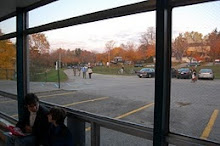About a year ago Madison got a new bike shop. Dream Bikes is a non-profit organization that sells used bikes, provides repair services, helps teenagers prepare for professional work, and promotes bicycling. The cost of the repair services is usually about half of what I think it should be. The customer service is much better than the shop I used to use, which appeared to cater to occasional non-commuting cyclists. One amazing thing is that Dream Bikes goes to great effort to fix the parts on my bike rather than replacing them. They don’t want to run up the bill. They want to avoid waste.
It’s amazing to me that one organization does so many things. There is a map on the wall showing a two-mile radius around the store, showing how places that seem too far to reach by bike actually aren’t that far. They help needy people in the neighborhood get bicycles. I happened to be in the store once as the manager went over strategies to balance part-time work and college with a young man who may have been the first in his family to go to college.
The store is located off Verona road, a few blocks from Allied Drive. It’s tempting to call that a rough area, but that would be ignoring all the kind people at Dream Bikes who are doing good deeds every day promoting cycling and helping the community.
Saturday, February 28, 2009
Tuesday, February 10, 2009
Obama's False Dichotomy in Approaching the Economic Troubles
So, you know, we can differ on some of the particulars, but again, the question I think that the American people are asking is, do you just want government to do nothing, or do you want it to do something? If you want it to do something, then we can have a conversation. But doing nothing -- that's not an option from my perspective. --President Obama
This refrain was repeated several times in President Obama’s primetime briefing yesterday: the contrast between doing something vs nothing. The implication is that monetary policy, fiscal stimulus, bailout packages we have had so far are nothing. He didn’t say what qualifies as something. I suspect for an approach to qualify as something it has to involve in borrowing close to a trillion dollars. We can debate what we’ll do with the money, but if you don’t agree with the concept of a huge stimulus “we’re probably not going to make much progress” in negotiating a plan.
I am a supporter of Obama and the Keynesian idea of using fiscal policy (i.e. borrowing money) to level out the peaks and valleys of the economic cycle. I have even argued for a fiscal policy board to use fiscal policy the same way the Federal Reserve uses monetary policy to stabilize the economy. My perception of this stimulus, however, is that it’s analogous to the health benefits of alcohol. Alcohol, in doses of one to two ounces of liquor a day in healthy adults, has health benefits that outweigh its health costs. It’s possible that there’s a special case where a doctor might instruct someone to take three to four ounces. (I have no idea if such a special case really exists.) I feel like we’re in that situation and making plans to load up on booze and debating what kind of drinks the "ethanol therapy program" will consist of. It’s hard to choose between brandy or scotch, but it’s not hard to find the will to have a drink. If the doctor instead recommended something less pleasant (prune juice, fresh vegetables, etc), I would probably ignore the advice for the most part. That’s what’s driving this stimulus package: 10% solid Keynesian economic theory and 90% desire to live beyond our means.
Living beyond our means got us here. We need to stop as soon as possible so future hiccups don’t turn into crises. For this fiscal stimulus to work in the long-run, it needs to be followed by a debt payoff package to slow down the economy and improve our debt-to GDP-ratio.
Tuesday, February 3, 2009
Two Speculative Bubbles in a 10-Year Period
Paul Krugman was on To the Best of Our Knowledge this week talking about economics and the current troubles with the economy. He expressed concern that we have had two speculative bubbles within a short period.
54 seconds
If the dot.com bubble was foolish, the real estate bubble was foolish on steroids.
54 seconds
After the dot.com bubble burst, you would have thought that people would be quite alert to the signs of irrational exuberance out there. What happened instead was this housing bubble inflated. And it was quite clear from the numbers that something very strange was going on. How did people fall for that? It's one thing to believe that a radical new technology might create some new paradigm where old ways of measuring value didn't matter, but houses have been around for around 6000 years or so. Why would you think suddenly that old valuation models for houses were no longer relevant? And yet people bought into it. -- Paul KrugmanTo some extent I bought into the dot.com idea. I really wanted to believe that my area of expertise, technology, would change everything. It did change most everything, but it didn't change business valuation models. I can understand how people in finance and real estate might have experienced a similar psychology. What I don't understand is how they rationalized it. They didn't even have a plausible story behind it. No revolutionary development happened. Just all of a sudden they thought we were running out of places to live.
If the dot.com bubble was foolish, the real estate bubble was foolish on steroids.
Subscribe to:
Posts (Atom)
